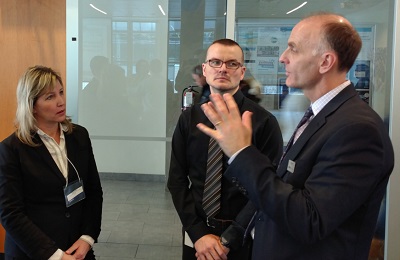
The UNESCO-UNEVOC International Centre: Who We Are | What We Do | Working With Us | Get in Touch
The UNEVOC Network: Learn About the Network | UNEVOC Network Directory
For Members: UNEVOC Centre Dashboard
Thematic Areas: Inclusion and Youth | Digital Transformation | Private Sector Engagement | SDGs and Greening TVET
Our Key Programmes & Projects: BILT: Bridging Innovation and Learning in TVET | Building TVET resilience | TVET Leadership Programme | WYSD: World Youth Skills Day
Past Activities: COVID-19 response | i-hubs project | TVET Global Forums | Virtual Conferences | YEM Knowledge Portal
Our Services & Resources: Publications | TVET Forum | TVET Country Profiles | TVETipedia Glossary | Innovative and Promising Practices | Toolkits for TVET Providers | Entrepreneurial Learning Guide
Events: Major TVET Events | UNEVOC Network News
Thursday, 09 February
Calgary, Canada
Experts in the field of education called for more collaboration to ensure inclusive and quality technical and vocational education and training (TVET) for all in Canada during a workshop organized by Bow Valley College, UNEVOC Centre, and UNESCO-UNEVOC International Centre.
The workshop took place from 8 to 9 February in the College’s campus in Calgary in the frame of Canada’s International Development Week (5 to 11 February, 2017). The theme of this year’s week is ‘Leave no one behind: Canada contributes to global goals!![]() ’ and puts the spotlight on Canada’s efforts to achieve the goals laid out in the 2030 Agenda for Sustainable Development agreed upon by the international community in September 2015. “Canada will continue to show global leadership in bringing people together to help achieve lasting progress” the Prime Minister of Canada Mr Justin Trudeau said in his statement
’ and puts the spotlight on Canada’s efforts to achieve the goals laid out in the 2030 Agenda for Sustainable Development agreed upon by the international community in September 2015. “Canada will continue to show global leadership in bringing people together to help achieve lasting progress” the Prime Minister of Canada Mr Justin Trudeau said in his statement![]() to mark the Week.
to mark the Week.
The workshop brought together twenty TVET experts from around Canada to discuss the steps to be taken to ensure that Canada contributes to the realization of the TVET related targets and objectives under Sustainable Development Goal 4 on education. The Goal namely calls on countries to “ensure inclusive and quality education for all and promote lifelong learning”.

Canada counts itself as one of the most active countries in the UNEVOC Network, thanks to the activities of its three UNEVOC Centres. The Bow Valley College has been a UNEVOC Centre since 2016, and is the largest community college in the province of Alberta. Over 15,000 students are taught and over 20,000 people seek to update their knowledge and skills at the College’s various campuses every year. Cégep de la Gaspésie et des Îles, campus de Carleton-sur-Mer (CEGEP) has been a UNEVOC Centre since 2004 and offers training to 300 students. The centre also conducts research activities that seek to document teachers’ good pedagogical practices in a context of distance learning. Colleges and Institutes Canada (CiCan) has been a UNEVOC Centre since 2012 and is the national organization representing colleges and institutes in Canada and internationally. 135 public post-secondary institutes of applied learning and applied research are part of the network.